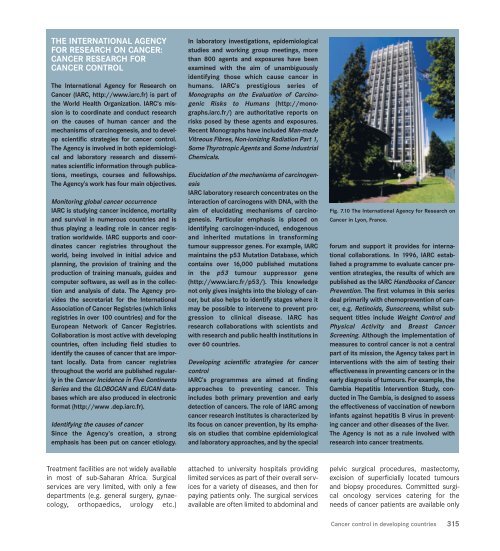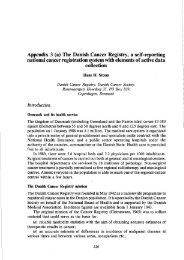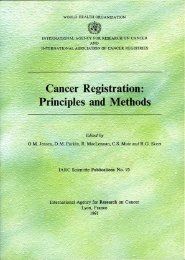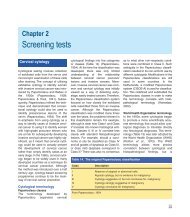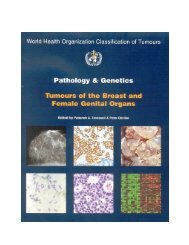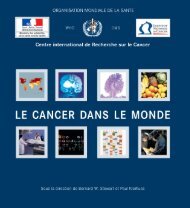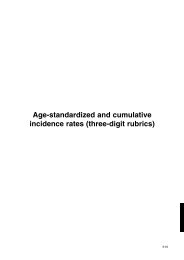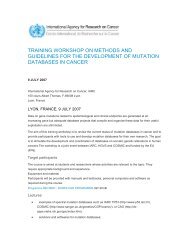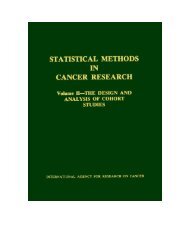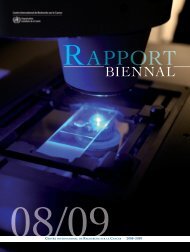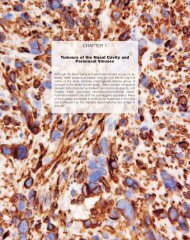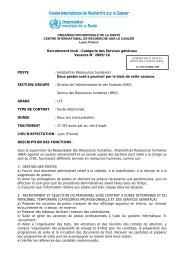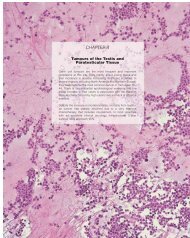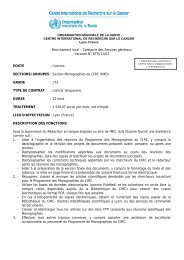world cancer report - iarc
world cancer report - iarc
world cancer report - iarc
You also want an ePaper? Increase the reach of your titles
YUMPU automatically turns print PDFs into web optimized ePapers that Google loves.
THE INTERNATIONAL AGENCY<br />
FOR RESEARCH ON CANCER:<br />
CANCER RESEARCH FOR<br />
CANCER CONTROL<br />
The International Agency for Research on<br />
Cancer (IARC, http://www.<strong>iarc</strong>.fr) is part of<br />
the World Health Organization. IARC's mission<br />
is to coordinate and conduct research<br />
on the causes of human <strong>cancer</strong> and the<br />
mechanisms of carcinogenesis, and to develop<br />
scientific strategies for <strong>cancer</strong> control.<br />
The Agency is involved in both epidemiological<br />
and laboratory research and disseminates<br />
scientific information through publications,<br />
meetings, courses and fellowships.<br />
The Agency’s work has four main objectives.<br />
Monitoring global <strong>cancer</strong> occurrence<br />
IARC is studying <strong>cancer</strong> incidence, mortality<br />
and survival in numerous countries and is<br />
thus playing a leading role in <strong>cancer</strong> registration<br />
<strong>world</strong>wide. IARC supports and coordinates<br />
<strong>cancer</strong> registries throughout the<br />
<strong>world</strong>, being involved in initial advice and<br />
planning, the provision of training and the<br />
production of training manuals, guides and<br />
computer software, as well as in the collection<br />
and analysis of data. The Agency provides<br />
the secretariat for the International<br />
Association of Cancer Registries (which links<br />
registries in over 100 countries) and for the<br />
European Network of Cancer Registries.<br />
Collaboration is most active with developing<br />
countries, often including field studies to<br />
identify the causes of <strong>cancer</strong> that are important<br />
locally. Data from <strong>cancer</strong> registries<br />
throughout the <strong>world</strong> are published regularly<br />
in the Cancer Incidence in Five Continents<br />
Series and the GLOBOCAN and EUCAN databases<br />
which are also produced in electronic<br />
format (http://www .dep.<strong>iarc</strong>.fr).<br />
Identifying the causes of <strong>cancer</strong><br />
Since the Agency’s creation, a strong<br />
emphasis has been put on <strong>cancer</strong> etiology.<br />
Treatment facilities are not widely available<br />
in most of sub-Saharan Africa. Surgical<br />
services are very limited, with only a few<br />
departments (e.g. general surgery, gynaecology,<br />
orthopaedics, urology etc.)<br />
In laboratory investigations, epidemiological<br />
studies and working group meetings, more<br />
than 800 agents and exposures have been<br />
examined with the aim of unambiguously<br />
identifying those which cause <strong>cancer</strong> in<br />
humans. IARC’s prestigious series of<br />
Monographs on the Evaluation of Carcinogenic<br />
Risks to Humans (http://monographs.<strong>iarc</strong>.fr/)<br />
are authoritative <strong>report</strong>s on<br />
risks posed by these agents and exposures.<br />
Recent Monographs have included Man-made<br />
Vitreous Fibres, Non-ionizing Radiation Part 1,<br />
Some Thyrotropic Agents and Some Industrial<br />
Chemicals.<br />
Elucidation of the mechanisms of carcinogenesis<br />
IARC laboratory research concentrates on the<br />
interaction of carcinogens with DNA, with the<br />
aim of elucidating mechanisms of carcinogenesis.<br />
Particular emphasis is placed on<br />
identifying carcinogen-induced, endogenous<br />
and inherited mutations in transforming<br />
tumour suppressor genes. For example, IARC<br />
maintains the p53 Mutation Database, which<br />
contains over 16,000 published mutations<br />
in the p53 tumour suppressor gene<br />
(http://www.<strong>iarc</strong>.fr/p53/). This knowledge<br />
not only gives insights into the biology of <strong>cancer</strong>,<br />
but also helps to identify stages where it<br />
may be possible to intervene to prevent progression<br />
to clinical disease. IARC has<br />
research collaborations with scientists and<br />
with research and public health institutions in<br />
over 60 countries.<br />
Developing scientific strategies for <strong>cancer</strong><br />
control<br />
IARC’s programmes are aimed at finding<br />
approaches to preventing <strong>cancer</strong>. This<br />
includes both primary prevention and early<br />
detection of <strong>cancer</strong>s. The role of IARC among<br />
<strong>cancer</strong> research institutes is characterized by<br />
its focus on <strong>cancer</strong> prevention, by its emphasis<br />
on studies that combine epidemiological<br />
and laboratory approaches, and by the special<br />
attached to university hospitals providing<br />
limited services as part of their overall services<br />
for a variety of diseases, and then for<br />
paying patients only. The surgical services<br />
available are often limited to abdominal and<br />
Fig. 7.10 The International Agency for Research on<br />
Cancer in Lyon, France.<br />
forum and support it provides for international<br />
collaborations. In 1996, IARC established<br />
a programme to evaluate <strong>cancer</strong> prevention<br />
strategies, the results of which are<br />
published as the IARC Handbooks of Cancer<br />
Prevention. The first volumes in this series<br />
deal primarily with chemoprevention of <strong>cancer</strong>,<br />
e.g. Retinoids, Sunscreens, whilst subsequent<br />
titles include Weight Control and<br />
Physical Activity and Breast Cancer<br />
Screening. Although the implementation of<br />
measures to control <strong>cancer</strong> is not a central<br />
part of its mission, the Agency takes part in<br />
interventions with the aim of testing their<br />
effectiveness in preventing <strong>cancer</strong>s or in the<br />
early diagnosis of tumours. For example, the<br />
Gambia Hepatitis Intervention Study, conducted<br />
in The Gambia, is designed to assess<br />
the effectiveness of vaccination of newborn<br />
infants against hepatitis B virus in preventing<br />
<strong>cancer</strong> and other diseases of the liver.<br />
The Agency is not as a rule involved with<br />
research into <strong>cancer</strong> treatments.<br />
pelvic surgical procedures, mastectomy,<br />
excision of superficially located tumours<br />
and biopsy procedures. Committed surgical<br />
oncology services catering for the<br />
needs of <strong>cancer</strong> patients are available only<br />
Cancer control in developing countries<br />
315


